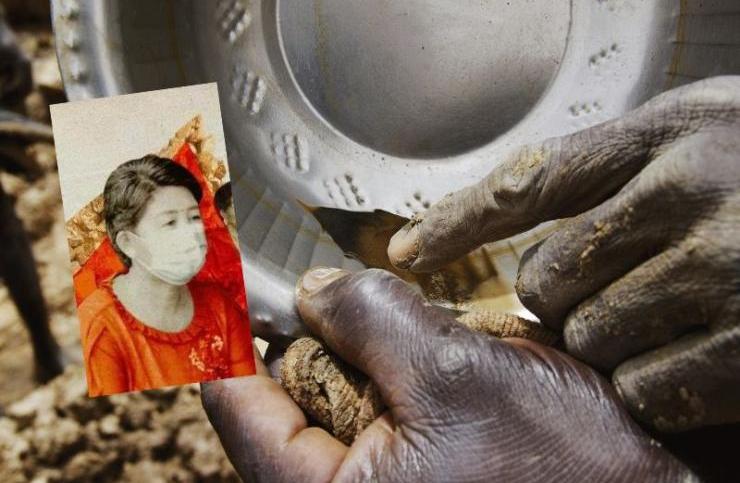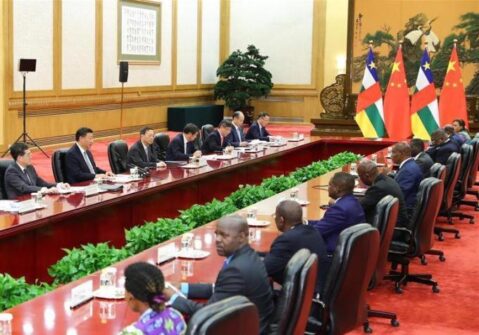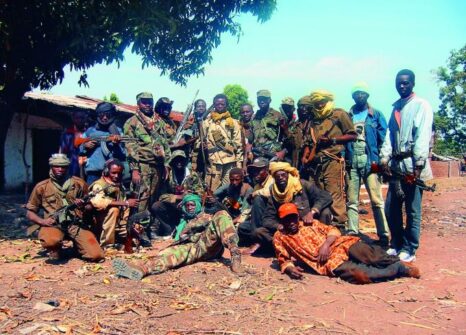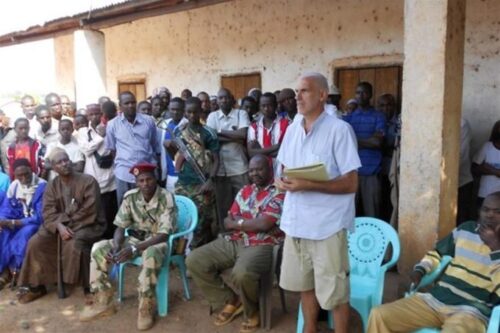Central African Republic. The Queen of the gold mines.

Zhao Baomei controls the country’s gold market. With her IMC, she has received numerous licenses, particularly in the areas of Yaloké, Bambari, and near the border with Cameroon. The IMC has caused serious damage to local populations and the environment.
The queen of the mines of the Central African Republic is a 54-year-old Chinese entrepreneur. Her name is Zhao Baomei and she heads Industrie Minière Centrafricaine (IMC). A little information about her.
The silent rise of Zhao Baomei in the Central African Republic is reconstructed in a detailed investigation by Africa Intelligence, published last June. The woman is part of the second ‘transhumance’ of Chinese investors who landed in the country in 2016. In power, freshly appointed as president, is Faustin-Archange Touadéra, who has opened the door to the new gold rush in Beijing, in the west and the centre of the country.

Chinese President Xi Jinping meets with Central African Republic President Faustin Archange Touadera and his delegation in Beijing. (Xinhua/Xie Huanchi)
In Bangui, Zhao Baomei resides across from the Lycée Boganda in the fourth arrondissement. At the top of the Central African government, her most influential contact is Léopold Mboli Fatran, minister of mines from 2016 to 2021, as well as a long-time friend of President Touadéra, of whom he is still an advisor today. In his mandate as minister, Mboli Fatran would have facilitated the assignment of numerous licenses to Zhao’s IMC, particularly in the areas of Yaloké, Bambari and near the border with Cameroon. Another man with whom Zhao has formed strong ties in recent years is the former Prime Minister Simplice Mathieu Sarandji, also belonging to the circle of President Touadéra’s loyalists.
Officially IMC holds fifteen licenses for mining in the Central African Republic. To evade the restrictions imposed by local regulations, the company has created and registered ad hoc branches in the country which allow it to acquire many more mines than it should.
An indicator of this system emerged from a report a few years ago by a group of United Nations experts. In 2020, IMC declared the production of 19 kg of gold, a quantity that is too low considering that, according to UN experts, its equivalent would be extracted in a month in the
Yaloké area alone.

A group of rebels in the Central African Republic. File Swm
For logistics, IMC has strategic support in Cameroon. In Limbe, near the city of Douala, not far from the coast of the Gulf of Guinea, there is a depot from where fuel, excavating machines and other vehicles are sent to the mines in the Central African Republic.
For the protection of the mining sites, Zhao Baomei did not hesitate to come to terms with local armed groups. According to Africa Intelligence, among these, there would be 3R (Retour, réclamation et réhabilitation), a formation made up of ethnic Fulani militiamen used by IMC to keep the installations in the west of the country safe.
Over the years, agreements have also been reached with the UPC (Unité pour la paix en Centrafrique), a rebel group led by Ali Darass, accused by the Bangui government of having killed, in March this year, nine Chinese technicians who worked in the mine of Chimbolo on behalf of the Gold Coast Group. According to a 2021 UN report, Zhao Baomei’s company has entrusted the protection of the Yassine site to the UPC.
Until 2018, Zhao Baomei always moved in the shadows. Then a scandal that broke out a hundred kilometres from Yaloké, in the town of Bozoum, caused her name to circulate in the international press. Here the extraction activities in some of the mines managed by a network of companies linked to IMC (Tian Xiang, SMC Mao, Meng and Jianin) have caused a huge spill of mercury into the Ouham river, where the concentration levels of the metal have well exceeded twenty-five times the authorized threshold.

Father Aurelio Gazzara has denounced the ecological disaster in the area of Bozoum caused by the mining activities.
Father Aurelio Gazzera, an Italian Carmelite missionary who has been working in Bozoum since 2003, knows this story well. “In April 2019, upon the arrival of the Chinese companies, I immediately documented with photos and videos the mining activities that were carried out in Bozoum, also sharing the materials collected with international media such as France 24, says the missionary”.
And he continues: “Faced with the ecological disaster that was taking place in the area, I returned to the site a second time and at that moment I was arrested, even if only for about ten minutes”.
But his story came to the attention of national politics in Bangui. Many government officials lashed out against Father Gazzera, demonstrating quite clearly that they are colluding with Zhao Baomei’s affairs. But other parliamentarians, who knew the missionary and his activities in Bozoum well, are asking for light to be shed on the matter.
“A parliamentary investigation has been launched, something as rare as it is serious in the Central African Republic – continues Gazzera – and it emerged that the licenses given to IMC in Bozoum had been granted without any checks, bypassing parliament which, instead, should have approved them. The ecological damage caused by the mercury spills from the mines has also been confirmed”.
In June 2020, eighteen months after the arrival of its bulldozers in Bozoum, also thanks to the complaints from Amnesty International, IMC was forced to leave the city.
To clean up her image, Zhao Baomei has promised to build two health centres and a school in some villages in the area. But to date, the only work put in place is a grandstand set up to allow local notables to watch military parades, while the signs of the havoc caused by the uncontrolled exploitation of mines remain along the Ouham river.
Rocco Bellantone



